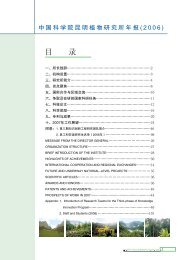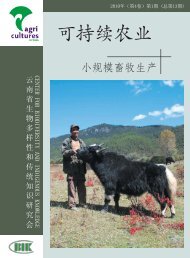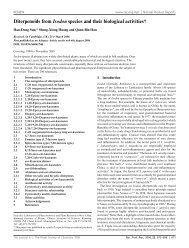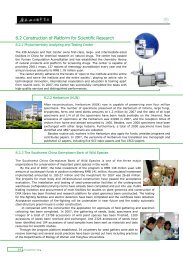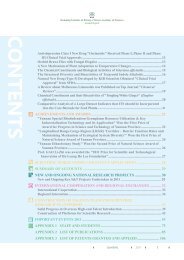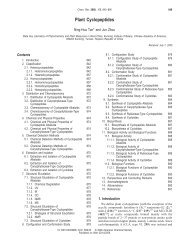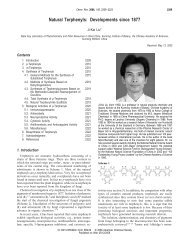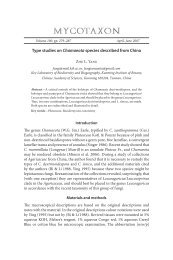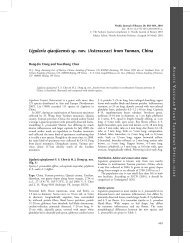<strong>Kunming</strong> <strong>Institute</strong> <strong>of</strong> <strong>Botany</strong>, <strong>Chinese</strong> <strong>Academy</strong> <strong>of</strong> SciencesAnnual ReportINTERNATIONAL COOPERATIONAND REGIONAL EXCHANGESInternational cooperation1. About 2012 international cooperationand exchangeIn 2012, KIB has 128 persons from 71 projectsvisiting 22 foreign countries for business, includingUK, Japan, USA and Canada. Thirteen personsattended academic meetings in China's TaiwanProvince 4 four times. KIB received 199 foreignscholars for visit. Moreover, it appointed 8 fulltimeforeign experts, fostered 9 overseas students,and jointly fostered 2 foreign PhD students. Itheld international meetings five times, and jointlypublished 70 SCI papers. It had 32 projects inprogress, including 18 new projects in 2012. Thetotal contracted fund was increased by RMB 10.53million.2. Key achievements and work progress <strong>of</strong>2012 international cooperation and exchange(1) Progress and achievements <strong>of</strong> internationalcooperation projectsUnder the support <strong>of</strong> CAS InternationalPartnership Program for Creative Research Teamsand the National Science Foundation (USA), KIB, incooperation with East Carolina University, conductedgenomics analysis on Physcomitrella patens <strong>of</strong> basaltaxa <strong>of</strong> terrestrial plants and found that the genome <strong>of</strong>Physcomitrella patens contains 57 gene families and128 genes originating from HGT, respectively frombacteria, fungus and virus.On 29 May 2012, LI De-Zhu, Director to KIB,represented the iBOL China National Committeeand signed "China-iBOL Memorandum <strong>of</strong>Understanding", signifying that China raised its voicein the international barcode <strong>of</strong> life affairs and tha theapplication <strong>of</strong> DNA barcode technique was promotedin China.(2) Foreign meetings and overseas trainingsFunded by the National Natural SciencesFoundation <strong>of</strong> China and CAS, "EcoHealth 2012Conference" was held in <strong>Kunming</strong> from 15-18 October 2012, organized by the InternationalAssociation for Ecology & Health, and co-organizedby KIB as well as Asia-Pacific Academic Consortiumfor Public Health, International Water Association,Stockholm International Water <strong>Institute</strong>, InternationalLivestock Research <strong>Institute</strong> and Hawaii East-West Center. Almost 300 participants attended thisconference, including 247 foreign participants. Thisconference included five themes: Epistemologyand interdisciplinary research, emerging infectiousdiseases, environmental health risks, food safetyand human health & ecological health policies,public awareness and education. In diversifiedforms <strong>of</strong> meeting reports, papers, exhibitions,artistic performance and informal meetings, itprovided participants with a platform for interactionand communication to the maximum. During thisconference, it selected 12 ecohealth documentariesproduced by participant research teams, coveringTibet Plateau, Mountains in Yunnan, Golden Triagnel —— INTERNATIONAL COOPERATION AND REGIONAL EXCHANGES ——
<strong>Kunming</strong> <strong>Institute</strong> <strong>of</strong> <strong>Botany</strong>, <strong>Chinese</strong> <strong>Academy</strong> <strong>of</strong> SciencesAnnual Report(Burma), Laos and Thailand, Tonle Sap Lake Area(Cambodia) and Mekong Delta Area (Vietnam).Meanwhile, it invited folk artists from minority areasin Southwest China to exhibit local communities’understanding, knowledge, practice and innovation<strong>of</strong> the ecological system and human health througha series <strong>of</strong> artistic exhibitions. This conferencegathered ecohealth experts and scholars fromdifferent countries and regions. They communicatedand interacted with community practitioners,providing a wider perspective for scientificresearches, and also an extensive platform for crossregionaland interdisciplinary cooperation. Throughknowledge collection and exchange activities beforethe conference, it established an effective knowledgesharingmechanism and published a group <strong>of</strong> highqualityacademic papers in EcoHealth, effectivelypromoting knowledge transfer.KIB and Biodiversity-Based EconomyDevelopment Office <strong>of</strong> Thailand (BEDO) held a9-day training <strong>of</strong> "Application <strong>of</strong> Ethnobotany in theDevelopment <strong>of</strong> New Plant Products" In Bangkokand Chiangmai, including 5 lectures and 4-dayfield practice and demonstration. 25 pr<strong>of</strong>essionalsattended this training, from BEDO branches, NDP,DOAE, BGO, HRDI, Chiang Mai University,and bio-pharmaceutical companies. This trainingwas mainly aimed at introducing ethnobotany, itsresearch methods and application in the biodiversityprotection and the development <strong>of</strong> new plant productsto further enhance the sustainable development <strong>of</strong>the bio-economy. This was the first time that ourethnobotany research team was invited by the foreigngovernment to provide systematic research methodtrainings abroad, which was great contributions tointernational scientific exchange and cooperation.(3) 2012 new international cooperation projects8 international or regional scientific exchange agreements were signed in 2012 as shown below:Agreement NameEconomic Plants Research & DevelopmentCooperation AgreementMemorandum <strong>of</strong> Understanding with University <strong>of</strong>Pavia (Italy)Cooperation agreement with Missouri BotanicalGardenMemorandum <strong>of</strong> Understanding on Plant ResourcesPreservation and Sustainable UtilizationLaboratory partners and partnership agreementCooperation with University <strong>of</strong> HohenheimCooperation on Plant Resources Preservation andSustainable UtilizationCooperation with Sam Houston State UniversityPartnerKorea Research <strong>Institute</strong> <strong>of</strong> Bioscience andBiotechnology (Korea)University <strong>of</strong> Pavia (Italy)Missouri Botanical Garden (USA)V. L. Komarov Botanical <strong>Institute</strong> (Russia)<strong>Chinese</strong> University <strong>of</strong> Hong KongUniversity <strong>of</strong> Hohenheim (Germany)Freie Universitt Berlin Germany (Germany)Sam Houston State University (USA)—— INTERNATIONAL COOPERATION AND REGIONAL EXCHANGES ——
- Page 2 and 3: Cover photos:51 3 62 4 71. Trogia v
- Page 4: ACHIEVEMENTS AND AWARDS ...........
- Page 7: Kunming Institute of Botany, Chines
- Page 10 and 11: Kunming Institute of Botany, Chines
- Page 12 and 13: Kunming Institute of Botany, Chines
- Page 14 and 15: Kunming Institute of Botany, Chines
- Page 16 and 17: Kunming Institute of Botany, Chines
- Page 18 and 19: Kunming Institute of Botany, Chines
- Page 20 and 21: Kunming Institute of Botany, Chines
- Page 22 and 23: Kunming Institute of Botany, Chines
- Page 25: Kunming Institute of Botany, Chines
- Page 29 and 30: Kunming Institute of Botany, Chines
- Page 31 and 32: Kunming Institute of Botany, Chines
- Page 33 and 34: Kunming Institute of Botany, Chines
- Page 35 and 36: SUMMARY OF ACCOUNTSIncome and Expen
- Page 37 and 38: Kunming Institute of Botany, Chines
- Page 39: Kunming Institute of Botany, Chines
- Page 43 and 44: Kunming Institute of Botany, Chines
- Page 45 and 46: Kunming Institute of Botany, Chines
- Page 47 and 48: Kunming Institute of Botany, Chines
- Page 49 and 50: Kunming Institute of Botany, Chines
- Page 51 and 52: Kunming Institute of Botany, Chines
- Page 53 and 54: Kunming Institute of Botany, Chines
- Page 55 and 56: Kunming Institute of Botany, Chines
- Page 57 and 58: Kunming Institute of Botany, Chines
- Page 59: Kunming Institute of Botany, Chines
- Page 62 and 63: Kunming Institute of Botany, Chines
- Page 64 and 65: Kunming Institute of Botany, Chines
- Page 66 and 67: Kunming Institute of Botany, Chines
- Page 68 and 69: Kunming Institute of Botany, Chines
- Page 70 and 71: Kunming Institute of Botany, Chines
- Page 72 and 73: Kunming Institute of Botany, Chines
- Page 74 and 75: Kunming Institute of Botany, Chines
- Page 76 and 77: Kunming Institute of Botany, Chines
- Page 78 and 79: Kunming Institute of Botany, Chines
- Page 80 and 81: Kunming Institute of Botany, Chines
- Page 82 and 83: Kunming Institute of Botany, Chines
- Page 84 and 85: Kunming Institute of Botany, Chines
- Page 86 and 87: Kunming Institute of Botany, Chines
- Page 88 and 89: Kunming Institute of Botany, Chines
- Page 90 and 91:
Kunming Institute of Botany, Chines
- Page 92 and 93:
Kunming Institute of Botany, Chines
- Page 94 and 95:
Kunming Institute of Botany, Chines
- Page 96 and 97:
Kunming Institute of Botany, Chines
- Page 98 and 99:
Kunming Institute of Botany, Chines
- Page 100 and 101:
Kunming Institute of Botany, Chines
- Page 102 and 103:
Kunming Institute of Botany, Chines
- Page 104 and 105:
Kunming Institute of Botany, Chines
- Page 106 and 107:
Kunming Institute of Botany, Chines
- Page 108 and 109:
Kunming Institute of Botany, Chines
- Page 110 and 111:
Kunming Institute of Botany, Chines
- Page 112 and 113:
Kunming Institute of Botany, Chines
- Page 114 and 115:
Kunming Institute of Botany, Chines
- Page 116 and 117:
Kunming Institute of Botany, Chines
- Page 118 and 119:
Kunming Institute of Botany, Chines
- Page 120 and 121:
Kunming Institute of Botany, Chines
- Page 122 and 123:
Kunming Institute of Botany, Chines
- Page 124 and 125:
Kunming Institute of Botany, Chines
- Page 126 and 127:
Kunming Institute of Botany, Chines
- Page 128 and 129:
Kunming Institute of Botany, Chines
- Page 130 and 131:
Kunming Institute of Botany, Chines
- Page 132:
Add: 132# Lanhei Road, Heilongtan,K




